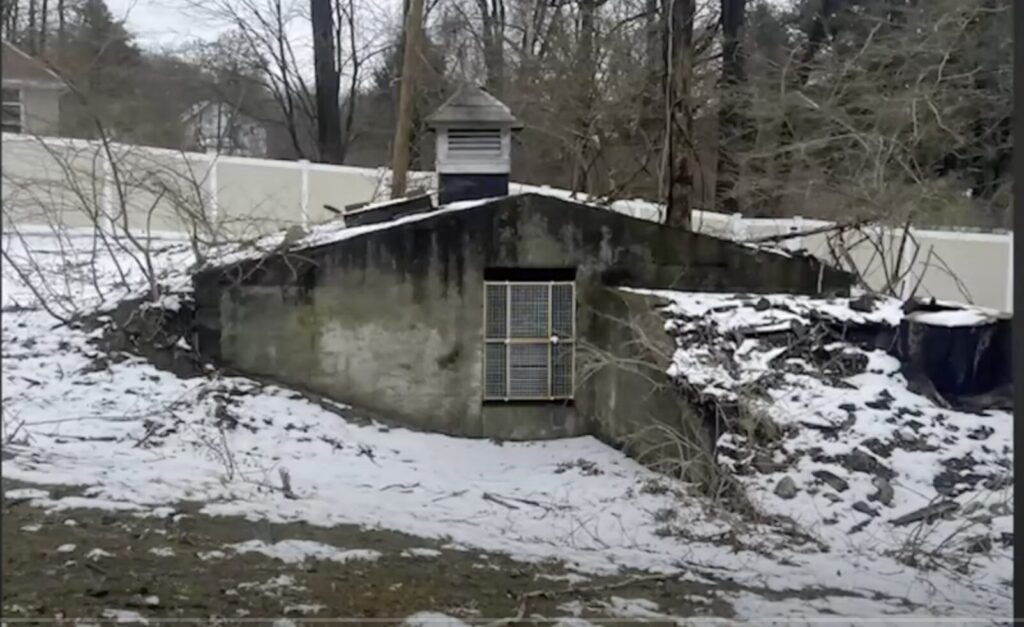Historical Commission Approves Two Demolitions. Agrees to Discuss Revised Plans for Jones Library Interior

The Amherst Historical Commission approved demolition of this sunken storage facility on Blue Hills Road at their meeting on June 3, 2024. Photo: Screen shot/YouTube/amherstma.gov
Report on the Meeting of the Amherst Historical Commission, June 3, 2024
This meeting was held over Zoom and was recorded. It can be viewed here.
Present: Robin Fordham (Chair), Pat Auth, Hetty Startup, Mikayla Rasnic, and Antonia Brillambourg. Absent: Madeleine Helmer.
Staff: Nate Malloy (Senior Planner) and Jacinta Williams (Planner)
Demolition of Cold Storage Unit on Blue Hills Road Approved
Despite a paucity of information about its history, the commission permitted the demolition of a small, sunken storage facility at 107 Blue Hills Road because it presented a danger to children playing in the area. Planner Nate Malloy and owner Aliciamarie Hampton have devoted considerable time trying to find out the history of the structure, when it was built and what it was used for, but have not recovered any useful information. Malloy said that it does appear in 1939 photos.
The structure has an asphalt roof with a cupola, a cement block interior, and a cement floor. It does not contain asbestos. The roof is level with the ground, and the whole structure is in disrepair, making it a hazard. Roofer Rick Palmisano estimated that it would cost $35,000 to $45,000 to repair the structure; Hampton is unwilling to spend that money and wants to demolish it instead.
Chair Robin Fordham noted that this was a curious building that may have been used for cold storage. She said that, given Amherst’s strong agricultural history, the structure may be architecturally significant, so she wanted to delay approval of the demolition until more research could be done. Hetty Startup mentioned that the structure is in an area historically used for worker housing. Pat Auth also wanted more time for research prior to the demolition. However, Mikayla Rasnic thought the commission would be unlikely to find more information.
The commission unanimously voted to approve demolition of the structure, but Startup and Fordham agreed to document it with photographs.
Commission Allows Demolition of 68 McClellan Street
Joel Greenbaum purchased the single-family, one-and-a-half story farmhouse at 68 McClellan, and said at the time that he hoped to renovate it. However, after study, he realized that the structure was in poor condition and could not be repaired enough to meet the town energy code. He requested permission to demolish it and build a new house, consistent with the local historic district standards.
The Historic Commission did not do a site visit to the house, but Startup said the building was typical of worker housing of the late 19th century. Features like its steep, narrow staircase, with the only bathroom being on the ground floor, are not favored by people today. She also said that she trusts Greenbaum’s judgment that renovation is not advisable. Fordham thought that the structure did not rise to the level of historic significance.
Abutter Nat Glennon spoke for replacing some of the trees that have been removed from the property, but was pleased that Greenbaum planned to leave part of the lot vacant. He had no objections to demolishing the existing house.
Commission to Reexamine Plans for Jones Library at July Meeting
In public comment, Hilda Greenbaum spoke about the new plans of the Jones Library Trustees to remove and discard most of the historic woodwork from the library interior in order to cut costs. She said she is very upset “at the total insensitivity of the trustees in regard to the historic interior that was very important to founder Samuel Minot Jones.” There is a historical preservation restriction on the building, she pointed out, and asked if these plans violate it. The commissioners were unsure, but agreed to put a review of the plans on the agenda of their next meeting. Fordham said she must recuse herself from discussions of historical preservation requirements of the Jones Library expansion because she is an employee of the Massachusetts Historical Commission.
Malloy was unsure if the town has received a final response to the Project Notification Form that the library submitted to the Massachusetts Historical Commission regarding its renovation plans.
Discussion: Should CPA Funds Be Used for Privately Owned Properties?
The commission members agreed to develop parameters for the use of Community Preservation Act (CPA) funds for repair of privately owned properties. Using town money for these repairs places a historic preservation restriction on the property for 30 years, and the commission needs to monitor that the restriction is adhered to. Malloy cited the Unitarian Universalist Society as a property owner that does a good job of monitoring itself, and pointed out that there is no one to enforce the restrictions on other properties. He thought conditions like historic preservation restrictions may be able to be added to the town’s new software to set up a workflow to monitor relevant properties.
Commissioners also agreed to try to do site visits two weeks prior to each scheduled hearing.
The Historical Commission will next meet on July 8.

That’s a potato storage cellar, probably for an extended family or possibly a small grocery store — the cupola and vented door makes me think potatoes (and the ell may have been used for squash). Here is a 1917 USDA publication on potato houses.
They probably bought in bulk in Hadley each fall and put their supplies away for winter. It also might have been a UM Ag professor building it on his own land as a demonstration for his students. (A century or more ago, UMass was teaching a lot more subsistence agriculture than people realize.)
Concrete makes me think the 1920s after the extinction of the American Chestnut.